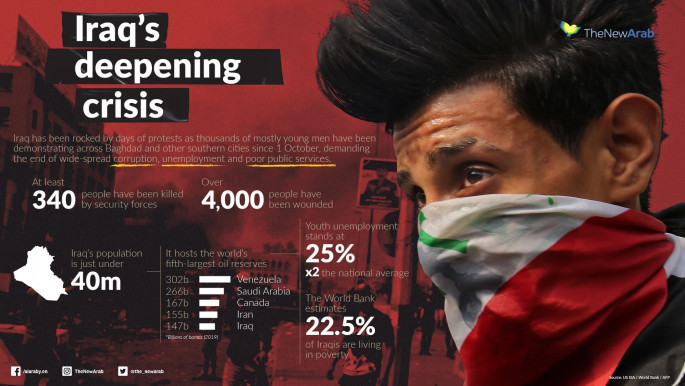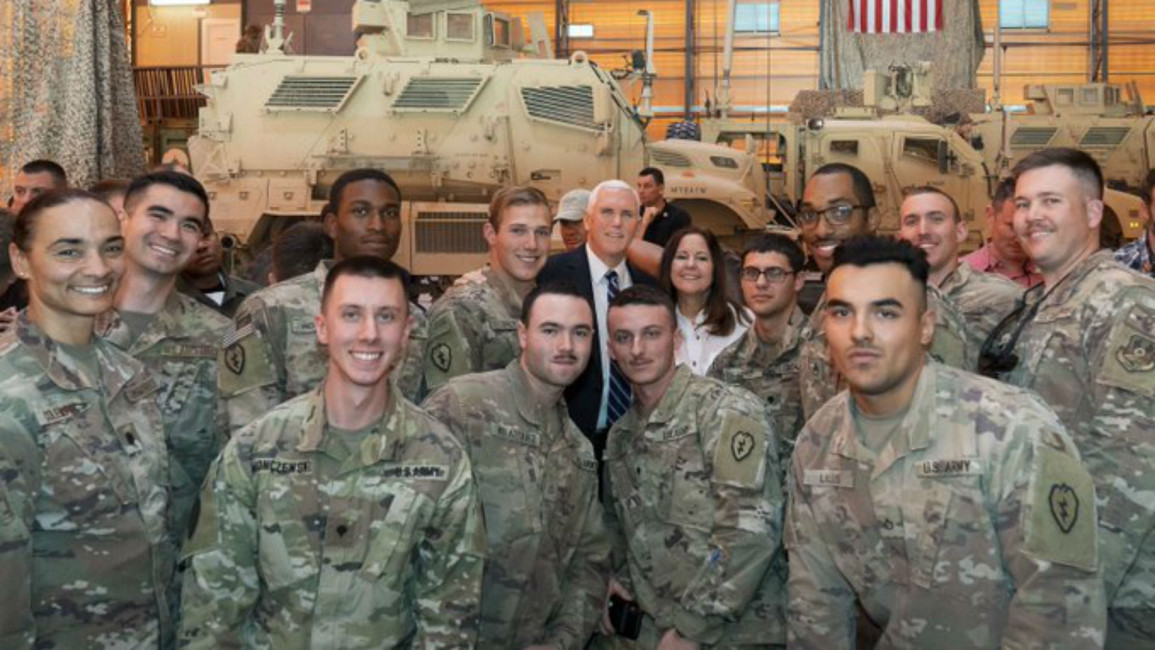Iraq leaders 'unaware' of Mike Pence's 'stealthy' Iraq visit as American VP avoids Baghdad
US Vice President Mike Pence avoided meeting Iraqi federal government leaders during a surprise trip on Saturday to the country.
In his first visit as vice president, Pence visited American troops at Ain al-Asad base in western Iraq's Anbar province, but was not expected to travel to the capital.
His trip came after weeks of anti-government rallies across Baghdad and the south.
Iraqi officials told AFP that Pence spoke to Prime Minister Adel Abdel Mahdi by telephone.
"There won't be a meeting as they had a phone call. The prime minister isn't going to Anbar" to meet Pence, one source said.
President Barham Saleh's office told AFP it was not aware Pence was coming to Iraq and had no meeting planned. The US embassy said it had no details to share.
Pence did met Iraqi Kurdish President Nechirvan Barzani and his prime minister Masrour Barzani in Arbil, the Kurdish presidency said, publishing pictures of the encounters.
Pence tweeted images of himself and his wife speaking to US forces and carrying a roast turkey, traditionally served during the American Thanksgiving holiday celebrated next week.
Comment: Tuk-tuks of Tahrir: The unlikely symbol of a revolution in Iraq
"Happy Thanksgiving from Iraq. @SecondLady and I are so honoured to be with our Soldiers, Sailors, Airmen, and Marines here in Iraq!" he tweeted.
 |
The visit echoed President Donald Trump's own surprise trip to Ain al-Asad a year ago, where he briefly met troops just after Christmas but controversially did not see officials in Baghdad.
Trump's visit was veiled in such secrecy that there was speculation most Iraqi authorities had not been told he president was coming.
Pence's trip came as the death toll from weeks of anti-government rallies across Iraq's capital and the south rose even further.
Read more: Indepth: Normalisation breeds impunity: Deafening silence as Israel strikes multiple Arab states
'Not welcome'
In July, the US singled out the leaders of two paramilitary groups in Iraq that Pence accused of being tied to Iran.
Rayan al-Kildani and Waad Qado - the former a Christian and the latter a member of the Shabak minority - were both sanctioned over "serious human rights abuse" by them or their organisations.
Kildani reacted to Pence's visit on Saturday, tweeting: "To the American vice president who came to Iraq stealthily... You are not welcome on Iraqi territory."
Kildani and Qado's factions belong to the Hashed al-Shaabi, a powerful Shia-majority paramilitary network that includes many groups with close ties to Tehran.
Hashed leaders and Iran have been widely criticised in the recent protests, accused of defending the very government the demonstrators want to bring down.
Many of their offices have been burned in Iraq's restive south, the scene of new protests on Saturday.
Mystery attacks
The US currently has 5,200 troops in Iraq, part of a US-led international coalition against IS.
Their presence at several bases in Iraq has been the subject of debate, with pro-Iranian Shia militias and politicians making frequent demands for their withdrawal.
In October, US Defence Secretary Mark Esper said American troops withdrawing from Syria would stay in Iraq "temporarily" before returning to the US.
The troops have been targeted in mystery strikes on several occasions in the past few months.
Most recently, at least 17 rockets struck a military base north of the Iraqi capital where US troops are deployed, Iraqi security sourced said on November 9.
Iraqi commander of operations Noman Zobaei said forces responded to the attack in a strike that “killed three terrorists and destroyed a vehicle”. A second vehicle loaded with another missile was seized from the scene of the operation, according to local Alsumaria TV.
It is unknown who is responsible for the attack however similar mystery strikes also targeted the base last month, though no damage or casualties were reported.
It is unknown who is responsible for the attacks however several mystery strikes have targeted Iraq's Popular Mobilisation Forces (PMF) - a coalition of some 70, mostly Shia militias backed by Iran - in recent months.
Since mid-July, more than five PMF arms' depots and training camps have been targeted in apparent attacks.
The latest such incident took place in October when unidentified aircraft launched airstrikes on PMF bases near Syria's border.
The PMF have repeatedly blamed Israel for raids by unmanned aircraft but Iraq's prime minister accused Israel of being behind the attacks.
"Investigations into the targeting of some Popular Mobilisation Forces positions indicate that Israel carried it out," Prime Minister Adel Abdul Mahdi was quoted by Al Jazeera as saying.
US and Middle East intelligence officials confirmed in August that a string of unclaimed attacks against the Shia militia bases in Iraq were carried out by Israel.
Israel has repeatedly bombed Iranian targets in neighbouring Syria, but an expansion of the campaign to Iraq would risk damaging Washington's relations with Baghdad.
Israel has accused Tehran of attempting to establish a land corridor from Iran to Lebanon, via Iraq and Syria, and the strikes appear to correspondent with this alleged supply route.
Iran has a strong military and militia presence in Iraq and Syria and backs Lebanese movement Hezbollah.
The PMF was established in 2014 from mostly-Shia armed groups and volunteers to fight the Islamic State group and is now formally part of Iraq's armed forces.
But the US and Israel fear some units are an extension of their arch-foe Iran and have been equipped with precision-guided missiles that could reach Israel.


![Minnesota Tim Walz is working to court Muslim voters. [Getty]](/sites/default/files/styles/image_684x385/public/2169747529.jpeg?h=a5f2f23a&itok=b63Wif2V)




![Debris near Rafic Hariri International Airport [Getty]](/sites/default/files/styles/image_330x185/public/2176162423.jpeg?h=a5f2f23a&itok=MCSK9mkM)
![An Israeli air strike on Jabalia killed teenage journalist Hassan Hamad [Screengrab/X]](/sites/default/files/styles/image_212x120/public/2024-10/hassan%20hamad1.jpg?h=c12e0b96&itok=KstD_5xk)
